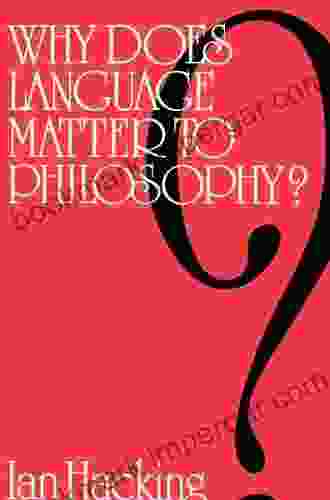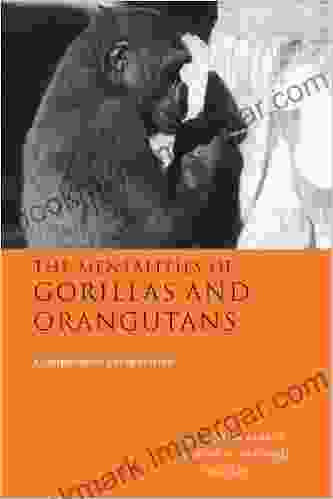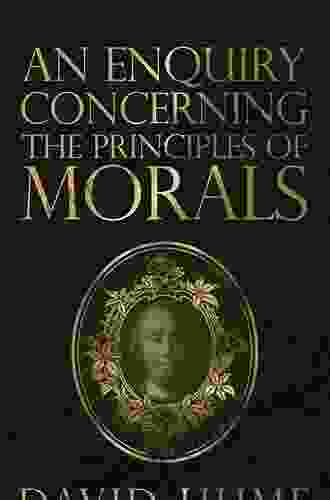Why Does Language Matter to Philosophy?

Language is a powerful tool that we use to communicate our thoughts and ideas, but it is also much more than that. Language is a way of organizing our world, making sense of our experiences, and understanding ourselves and others. It is also a way of creating and expressing art, literature, and philosophy.
4.8 out of 5
| Language | : | English |
| File size | : | 21797 KB |
| Print length | : | 208 pages |
Philosophy is the study of the fundamental nature of reality and existence. It is a broad and complex discipline that encompasses many different areas of inquiry, including metaphysics, epistemology, ethics, and aesthetics. Language is essential to philosophy because it is the medium through which we express our philosophical ideas. It is also a tool that we use to analyze and critique our own thinking.
The relationship between language and philosophy is a complex and multifaceted one. On the one hand, language is a necessary tool for philosophical inquiry. Without language, we would not be able to express our thoughts or share our ideas with others. On the other hand, language can also be a hindrance to philosophical inquiry. The limitations of language can make it difficult to express complex ideas, and the ambiguity of language can lead to misunderstandings and confusion.
Despite the challenges, language remains an essential tool for philosophy. It is through language that we are able to explore the fundamental questions of life and the universe. It is also through language that we are able to share our philosophical insights with others and to build a body of knowledge that can be passed down from generation to generation.
In this article, we will explore the complex relationship between language and philosophy. We will examine how language shapes our understanding of the world and how philosophical inquiry can shed light on the nature of language itself. We will also discuss some of the challenges and limitations of language as a tool for philosophical inquiry.
The Power of Language
Language is a powerful tool that we use to communicate our thoughts and ideas. It is also a tool that we use to organize our world, make sense of our experiences, and understand ourselves and others. Language allows us to share our knowledge and culture with others, and it is also a way of creating and expressing art, literature, and philosophy.
The power of language is evident in the fact that it can be used to persuade, to inspire, and to change the world. Language can be used to express our love, our anger, and our hopes and dreams. It can be used to teach, to learn, and to explore the unknown. Language is a powerful tool that we can use to shape our world and to create a better future for ourselves and for others.
The Limits of Language
Despite its power, language is also limited. There are some things that cannot be expressed in words. There are also some things that are difficult to express in words, and these things can sometimes lead to misunderstandings and confusion.
One of the limitations of language is that it is often ambiguous. The same word can have different meanings in different contexts, and this can lead to confusion. For example, the word "love" can mean different things to different people. It can mean romantic love, platonic love, or even the love of God. When people use the word "love" in different ways, it can lead to misunderstandings and conflict.
Another limitation of language is that it is often imprecise. Words cannot always capture the exact meaning of our thoughts and feelings. This can lead to frustration and misunderstanding. For example, the word "happy" can mean different things to different people. It can mean feeling content, joyful, or even ecstatic. When people use the word "happy" in different ways, it can lead to misunderstandings and disappointment.
Despite its limitations, language remains an essential tool for philosophy. It is through language that we are able to express our philosophical ideas and to share them with others. It is also through language that we are able to analyze and critique our own thinking.
The Relationship Between Language and Philosophy
The relationship between language and philosophy is a complex and multifaceted one. On the one hand, language is a necessary tool for philosophical inquiry. Without language, we would not be able to express our thoughts or share our ideas with others. On the other hand, language can also be a hindrance to philosophical inquiry. The limitations of language can make it difficult to express complex ideas, and the ambiguity of language can lead to misunderstandings and confusion.
One of the ways in which language can be a hindrance to philosophical inquiry is by limiting our understanding of the world. Language is a system of symbols that we use to represent the world around us. However, these symbols are not always perfect representations of the things they represent. This can lead to misunderstandings and confusion.
For example, the word "chair" is a symbol that we use to represent a physical object that we sit on. However, the word "chair" does not capture all of the properties of a chair. It does not tell us what a chair is made of, how it is constructed, or how comfortable it is to sit on. This can lead to misunderstandings if we try to use the word "chair" to describe a particular object.
Another way in which language can be a hindrance to philosophical inquiry is by obscuring the truth. Language is often used to express our beliefs and opinions. However, our beliefs and opinions are not always true. This can lead to misunderstandings and confusion if we try to use language to convey the truth.
For example, the statement "The sun is the center of the universe" is a belief that was held by many people for centuries. However, this belief is not true. The sun is not the center of the universe. The earth is the center of the universe. This misunderstanding was caused by the fact that people used the word "universe" to refer to the solar system. When we use language to express our beliefs and opinions, we need to be careful not to obscure the truth.
Despite the challenges, language remains an essential tool for philosophy. It is through language that we are able to express our philosophical ideas and to share them with others. It is also through language that we are able to analyze and critique our own thinking.
Language is a powerful tool that we use to communicate our thoughts and ideas, but it is also much more than that. Language is a way of organizing our world, making sense of our experiences, and understanding ourselves and others. It is also a way of creating and expressing art, literature, and philosophy.
The relationship between language and philosophy is a complex and multifaceted one. On the one hand, language is a necessary tool for philosophical inquiry. Without language, we would not be able to express our thoughts or share our ideas with others. On the other hand, language can also be a hindrance to philosophical inquiry. The limitations of language can make it difficult to express complex ideas, and the ambiguity of language can lead to misunderstandings and confusion.
Despite the challenges, language remains an essential tool for philosophy. It is through language that we are able to explore the fundamental questions of life and the universe. It is also through language that we are able to share our philosophical insights with others and to build a body of knowledge that can be passed down from generation to generation.
4.8 out of 5
| Language | : | English |
| File size | : | 21797 KB |
| Print length | : | 208 pages |
Do you want to contribute by writing guest posts on this blog?
Please contact us and send us a resume of previous articles that you have written.
 Book
Book Novel
Novel Page
Page Chapter
Chapter Text
Text Story
Story Genre
Genre Reader
Reader Library
Library Paperback
Paperback E-book
E-book Magazine
Magazine Newspaper
Newspaper Paragraph
Paragraph Sentence
Sentence Bookmark
Bookmark Shelf
Shelf Glossary
Glossary Bibliography
Bibliography Foreword
Foreword Preface
Preface Synopsis
Synopsis Annotation
Annotation Footnote
Footnote Manuscript
Manuscript Scroll
Scroll Codex
Codex Tome
Tome Bestseller
Bestseller Classics
Classics Library card
Library card Narrative
Narrative Biography
Biography Autobiography
Autobiography Memoir
Memoir Reference
Reference Encyclopedia
Encyclopedia Jacob Abbott
Jacob Abbott J M Orend
J M Orend Isser Harel
Isser Harel Michael H Graham
Michael H Graham J T Cloutier
J T Cloutier Pankaj Gupta
Pankaj Gupta Jack O Connor
Jack O Connor John Sonmez
John Sonmez Patrick Kelley
Patrick Kelley Huw Heywood
Huw Heywood Seth G Jones
Seth G Jones Ian Jenkins
Ian Jenkins Howard Blum
Howard Blum Ira Jacques
Ira Jacques Meika Loe
Meika Loe Iron Maiden
Iron Maiden Marianna Sheldrake
Marianna Sheldrake Joseph Tully
Joseph Tully Howard P Boyd
Howard P Boyd Rita Allen
Rita Allen
Light bulbAdvertise smarter! Our strategic ad space ensures maximum exposure. Reserve your spot today!
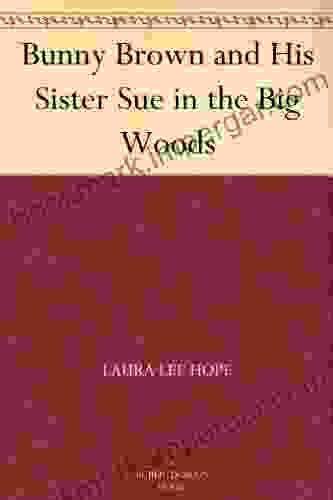
 Brayden ReedBunny Brown and His Sister Sue in the Big Woods: A Classic Tale of Adventure...
Brayden ReedBunny Brown and His Sister Sue in the Big Woods: A Classic Tale of Adventure... Walter SimmonsFollow ·9.3k
Walter SimmonsFollow ·9.3k Hugh BellFollow ·14.8k
Hugh BellFollow ·14.8k Jack PowellFollow ·14.6k
Jack PowellFollow ·14.6k Phil FosterFollow ·4k
Phil FosterFollow ·4k Jaime MitchellFollow ·16.6k
Jaime MitchellFollow ·16.6k Theo CoxFollow ·10.3k
Theo CoxFollow ·10.3k Jermaine PowellFollow ·2.2k
Jermaine PowellFollow ·2.2k Keith CoxFollow ·17.3k
Keith CoxFollow ·17.3k

 Mike Hayes
Mike HayesUnlock Your Nonprofit Potential: A Comprehensive Guide to...
: Embarking on the Path to Impactful...
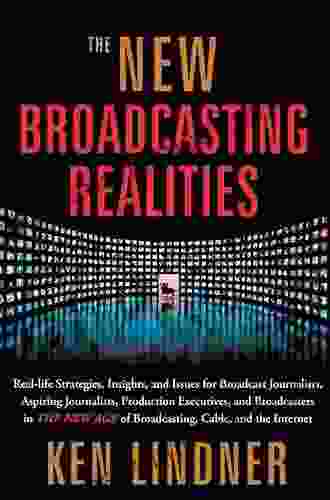
 Cody Russell
Cody RussellUnlock the Secrets of Captivating Radio Programming:...
In the fiercely competitive world of...

 Aron Cox
Aron CoxUnveiling the Enchanting World of Beth Inspired Eye...
A Realm of Imagination and Wonder Embark on...
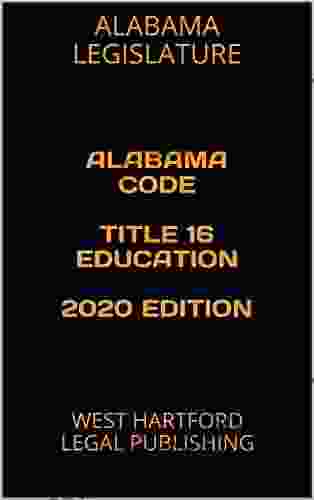
 Felix Carter
Felix CarterUnlock the Secrets of Legal Publishing with West Hartford...
West Hartford Legal Publishing, the renowned...

 Henry Hayes
Henry HayesUnveiling the Secrets of the Panama Papers: Exposing...
The Panama Papers is a groundbreaking...
4.8 out of 5
| Language | : | English |
| File size | : | 21797 KB |
| Print length | : | 208 pages |


